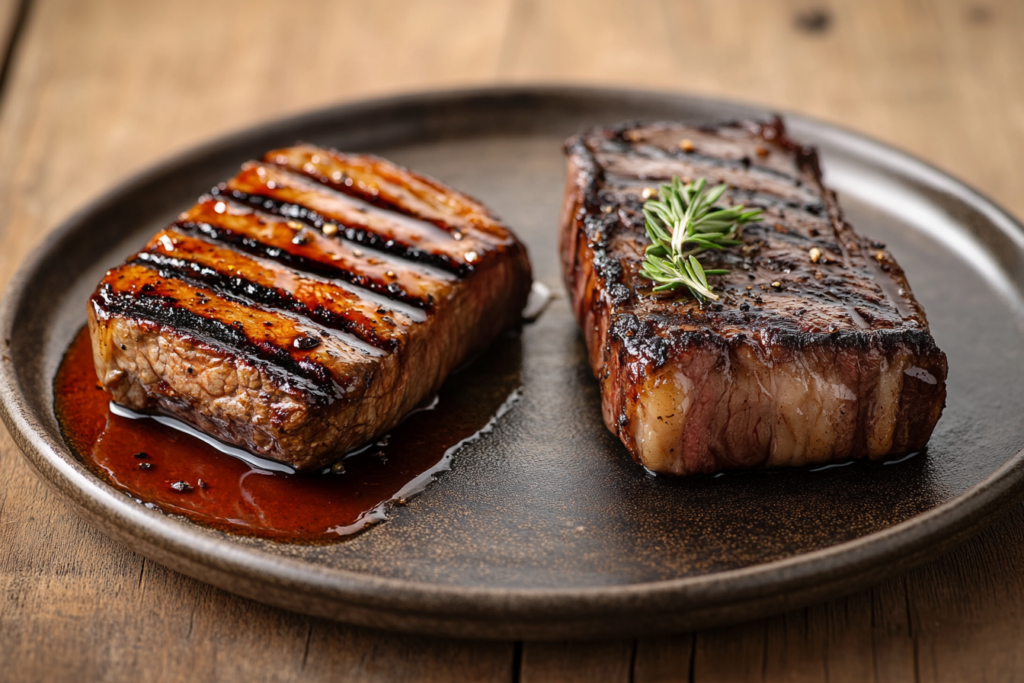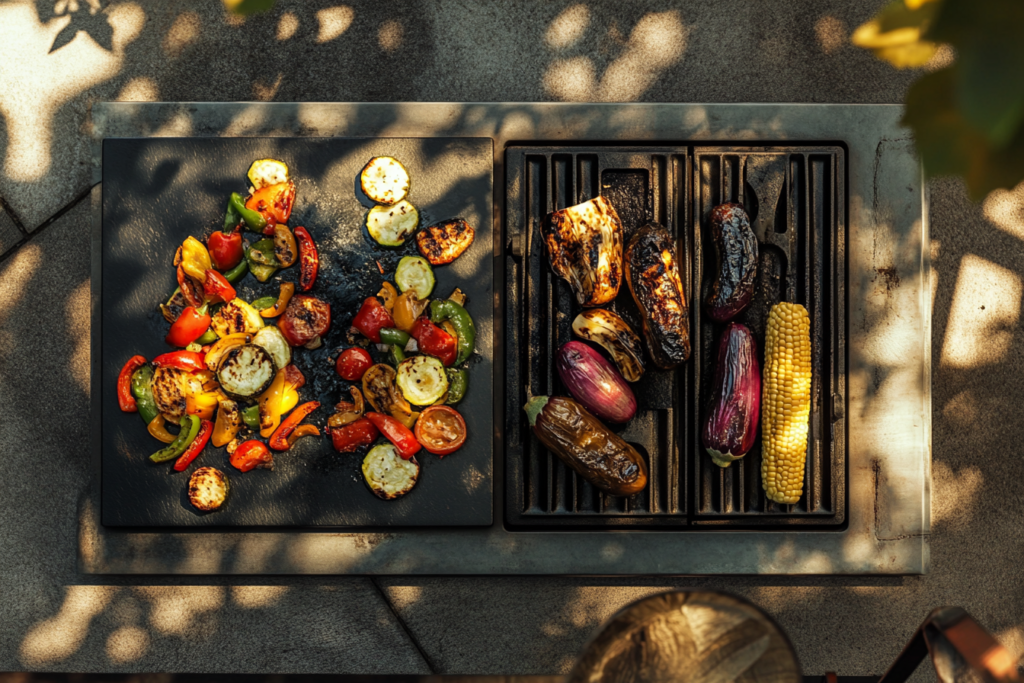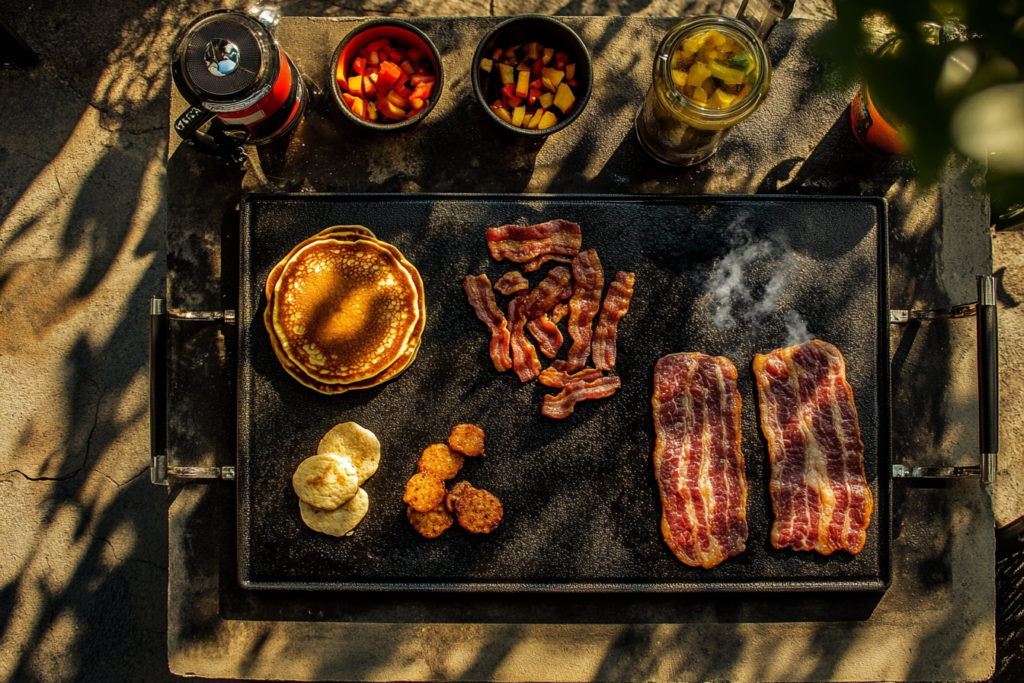Introduction
When it comes to outdoor cooking, many people wonder: Is Blackstone healthier than grill? Both the Blackstone griddle and traditional grills offer unique benefits, but health-conscious cooks often need clarity on which option supports healthier eating. This article explores the health factors of both cooking methods, helping you decide which one aligns with your goals.
A griddle, with its flat cooking surface, is excellent for stir-fries, pancakes, and evenly seared meats. On the other hand, grills are favored for their open flames, which impart a smoky flavor and allow fat to drip away from food. But the real question remains: Is Blackstone healthier than grill?
In this article, we’ll analyze the health factors of each method, compare their strengths and weaknesses, and provide insights to help you make an informed choice. Whether you’re a seasoned griller or a griddle enthusiast, you’ll discover which cooking style aligns best with your health goals.
1. Is Blackstone Healthier Than Grill? Understanding Both Options
To properly assess the healthiness of these cooking methods, it’s essential to understand how they work and what sets them apart.
1.1. What Makes Blackstone a Healthier Alternative to Grills?
A Blackstone griddle is a flat, durable cooking surface, often made of cold-rolled steel, that distributes heat evenly. Unlike grills, it lacks grates and open flames, offering a smooth surface ideal for cooking foods like eggs, bacon, pancakes, and stir-fried dishes.
Key Features:
- Large cooking area for preparing multiple dishes simultaneously.
- Flat surface prevents small foods from falling through, making it versatile for delicate ingredients like fish and chopped vegetables.
- Commonly powered by propane gas, ensuring consistent heat distribution.
1.2. Traditional Grills: Are They Healthier Than Blackstone?
A traditional grill, whether charcoal or gas-powered, uses open flames and grates to cook food. The radiant heat and direct exposure to fire make grills perfect for achieving smoky flavors and charred textures.
Key Features:
- Designed to let fat drip away from food, reducing overall fat content.
- Excellent for cooking larger cuts of meat, like steaks and ribs.
- Adds a distinct charred flavor that many people associate with grilling.
1.3. Key Differences Between Blackstone Griddles and Grills
Heat Distribution:
- Blackstone griddles provide even heat across the surface, ensuring consistent cooking for all food items.
- Grills use radiant heat and direct flames, leading to hot spots and variable cooking results.
Fat Retention:
- On a griddle, fat remains on the surface, often enhancing flavor but increasing calorie content.
- Grills allow fat to drip away, potentially reducing calorie intake.
Flavor Profile:
- Griddles excel at caramelizing and browning, but they lack the smoky, charred flavors that grills produce.
2. Is Blackstone Healthier Than Grill? A Look at Cooking Health Factors
When deciding whether the Blackstone griddle or a grill is healthier, several health-related factors need to be considered. From fat retention to temperature control, the way each method affects food can significantly impact your diet.
2.1. Does Blackstone Retain More Fat Than a Grill?
One of the primary differences between griddles and grills lies in how they handle fat during cooking.

On a Blackstone Griddle:
- Fat released from meat remains on the surface, often being reabsorbed during the cooking process.
- While this enhances flavor and keeps food moist, it also increases calorie intake compared to grilling.
On a Grill:
- Fat drips through the grates and away from the food.
- This reduces the overall fat content, making grilled dishes generally leaner.
Example: A grilled steak will have less retained fat compared to a steak cooked on a griddle, assuming no additional butter or oil is used.
2.2. Does Blackstone’s Lower Heat Make It Healthier Than Grill?
Cooking temperature plays a significant role in the production of harmful compounds during food preparation. High-heat cooking, especially with grills, can lead to the formation of carcinogens like polycyclic aromatic hydrocarbons (PAHs) and heterocyclic amines (HCAs).
Grill Risks:
- The intense heat and smoke from grilling can create carcinogenic compounds, particularly when fat drips onto open flames. These compounds are then absorbed into the food.
- Foods like burgers and chicken, when grilled for long periods, are particularly prone to this issue.
Griddle Benefits:
- Griddles operate at lower, more controlled temperatures, reducing the risk of harmful compound formation.
- The absence of smoke and open flames makes griddles a safer option in this regard.
2.3. Oil Usage
Oil plays a crucial role in both griddling and grilling, but the amount and purpose vary significantly between the two methods.
Griddles:
- Require a thin layer of oil to prevent food from sticking.
- Excess oil can lead to higher calorie intake if not managed properly.
Grills:
- Typically require less oil, as the food is placed directly on the grates.
- However, lack of oil can cause some foods to dry out, which may affect their overall flavor.
To explore the benefits of different cooking oils and how to use them effectively, visit Healthy Cooking Oils and Their Benefits.
2.4. Nutritional Retention
Both griddles and grills impact the nutrient content of your food, but they do so in different ways.
Grill Pros:
- Faster cooking times often preserve vitamins and minerals.
- Dripping fat may reduce the retention of certain fat-soluble nutrients.
Griddle Pros:
- Gentle, even heat minimizes nutrient loss caused by overcooking or charring.
- Retains the juices of meats and vegetables, which may hold valuable nutrients.
3. Is Blackstone Griddle or Grill Healthier? The Health Debate
The healthiness of the Blackstone griddle versus a traditional grill is a nuanced topic. It largely depends on the type of food being cooked and individual health priorities.
3.1. Is Meat Healthier on Blackstone Griddles or Traditional Grills?
When cooking meat, the healthiness of each method depends on factors like fat content, cooking time, and exposure to harmful compounds.
Blackstone Griddle:
- Meat retains its natural juices, making it tender and flavorful without additional sauces.
- However, the retained fat increases calorie and fat intake.
Grill:
- Grilling allows fat to drip away, making meat leaner and potentially healthier.
- High heat and charred edges can create carcinogens like HCAs, particularly in well-done or burnt meat.
Verdict: For leaner cuts of meat, grilling is slightly healthier, provided that over-charring is avoided.
3.2. Cooking Vegetables: Is Blackstone Healthier Than Grill?
Vegetables cook differently on a griddle compared to a grill, and the cooking method can affect both health and flavor.

Blackstone Griddle:
- Ideal for stir-frying and sautéing vegetables, preserving their natural nutrients.
- Even heat prevents burning, reducing the risk of nutrient loss.
Grill:
- Provides a smoky, charred flavor but risks overcooking delicate vegetables like zucchini or asparagus.
- Direct heat can lead to uneven cooking, potentially burning the outer layers while undercooking the inside.
Verdict: For delicate vegetables, the griddle is the healthier option due to its controlled heat. For heartier vegetables, like bell peppers or corn, grilling adds unique flavors without sacrificing health benefits.
3.3. Popular Opinions and Expert Insights
What Health Experts Say:
- Many health experts favor griddles for their ability to cook foods evenly and at moderate temperatures, minimizing harmful compounds. For detailed recipes, explore our Blackstone Recipes Guide.
- Dietitians often recommend grilling for its ability to reduce fat content in meats but caution against over-charring.
Consumer Opinions:
- Many home cooks prefer the Blackstone griddle for its versatility and ease of use, particularly for breakfast and stir-fry dishes.
- Grill enthusiasts highlight the unbeatable smoky flavor and fat-draining benefits of grilling.
4. Is Blackstone a Healthier and Practical Choice Than Grill?
While health is a key consideration, other practical factors often influence the choice between a Blackstone griddle and a grill. These include flavor preferences, ease of cleaning, and environmental impact.
4.1. Flavor Preferences
The flavor profiles created by griddles and grills are vastly different, catering to unique tastes and cooking needs.

Griddle Flavor:
- Caramelization is the hallmark of griddle cooking, offering a rich, slightly sweet flavor profile.
- Perfect for stir-fries, burgers, and breakfast items like pancakes and bacon.
Grill Flavor:
- The open flames of a grill produce a smoky, charred flavor that many people associate with barbecues.
- Ideal for meats like steaks, ribs, and chicken, as well as hearty vegetables like corn or bell peppers.
Takeaway: If smoky flavor is your top priority, the grill wins. For rich caramelization, the Blackstone griddle is unbeatable.
4.2. Convenience and Cleanup
Ease of use and cleanup are crucial factors, especially for busy home cooks or those new to outdoor cooking. However, to avoid common mistakes, read our guide on What Not to Do on a Blackstone Griddle.
Blackstone Griddle:
- Features a flat surface that is easy to scrape clean after cooking.
- Requires seasoning to maintain its non-stick surface, adding an extra maintenance step.
Grill:
- Cleaning grill grates can be time-consuming and messy, particularly if fat drips onto the burners.
- Charcoal grills require additional cleanup for ash and coal remnants.
Verdict: The Blackstone griddle offers easier cleanup, but grills provide a more rustic, traditional cooking experience.
4.3. Environmental Impact
Sustainability is an increasing concern for many cooks. Comparing the environmental impact of griddles and grills sheds light on which option is greener.
Blackstone Griddle:
- Typically runs on propane, which emits fewer pollutants compared to charcoal.
- Durable and long-lasting, reducing waste over time.
Grill:
- Charcoal grills produce significantly more CO2 emissions than gas-powered griddles or grills.
- Gas grills are more eco-friendly but still consume non-renewable resources.
Takeaway: For eco-conscious cooking, a gas-powered griddle is a better option than a charcoal grill.
5. Final Comparison: Blackstone vs Grill
After analyzing the health, flavor, and practical aspects of both cooking methods, it’s time to summarize which is better for specific cooking scenarios and individual preferences.
5.1. When to Choose a Blackstone Griddle
The Blackstone griddle excels in versatility and even heat distribution, making it ideal for certain types of meals and cooking preferences. For more inspiration, check out our list of Top Dishes to Cook on a Blackstone Griddle.
Best For:
- Breakfast Foods: Perfect for pancakes, eggs, bacon, and hash browns due to its flat surface.
- Delicate Foods: Handles fragile items like fish fillets and vegetables without burning or over-charring.
- Stir-Fries and Sautés: Provides consistent high heat for stir-fried dishes and evenly cooked sautéed ingredients.
Health Considerations:
- Retains fats and juices, making it suitable for foods where flavor is prioritized over calorie reduction.
- Reduces exposure to harmful compounds like HCAs and PAHs due to moderate cooking temperatures.
Verdict: Choose a griddle if you want versatility, easier maintenance, and health-focused cooking at lower temperatures.
5.2. When to Choose a Grill
The traditional grill shines when smoky flavors and fat reduction are key priorities.
Best For:
- Grilling Meats: Steaks, ribs, and chicken benefit from the high heat and fat-dripping properties of a grill.
- Charred Vegetables: Adds a smoky flavor and slightly crispy texture to heartier vegetables like corn or eggplant.
- Barbecues: Provides the authentic outdoor cooking experience many people seek during social gatherings.
Health Considerations:
- Reduces fat content by allowing it to drip through the grates, making it ideal for leaner meals.
- Requires careful attention to avoid over-charring, which can produce carcinogens.
Verdict: Choose a grill if smoky flavor, fat reduction, and traditional cooking experiences are your main priorities.
6. FAQs About Blackstone vs Grill for Health
6.1. Does Grilling Create More Harmful Compounds?
Yes, grilling at high temperatures can create harmful compounds like heterocyclic amines (HCAs) and polycyclic aromatic hydrocarbons (PAHs). These are formed when fat drips onto open flames, producing smoke that coats the food.
Tip: To minimize this risk, avoid over-charring and trim excess fat before grilling.
6.2. Does Cooking on a Griddle Require More Oil?
Cooking on a griddle often requires a thin layer of oil to prevent sticking and enhance flavor. While this can add calories, the amount of oil used is manageable with proper application.
Tip: Use a squeeze bottle to apply oil evenly, and opt for high smoke-point oils like avocado or canola oil for healthier cooking.
6.3. Can a Griddle Replace a Grill Entirely?
While a griddle offers versatility and a healthier cooking process for certain foods, it cannot replicate the smoky flavor and charred textures of a grill. Conversely, grills lack the ability to handle delicate foods like eggs or pancakes effectively.
Conclusion: A griddle and grill each have their strengths, and the ideal choice depends on your cooking needs and health goals.
Conclusion
Choosing between a Blackstone griddle and a traditional grill ultimately comes down to personal priorities. Griddles excel in health-focused cooking, thanks to their even heat and lower cooking temperatures, which reduce the formation of harmful compounds. They’re perfect for versatile meals and require less maintenance.
Grills, on the other hand, are a great choice for leaner meats, smoky flavors, and an authentic barbecue experience. However, careful attention is required to avoid over-charring and carcinogen formation.
Whether you prioritize flavor, health, or convenience, understanding the pros and cons of each method allows you to make the best decision for your culinary needs.
